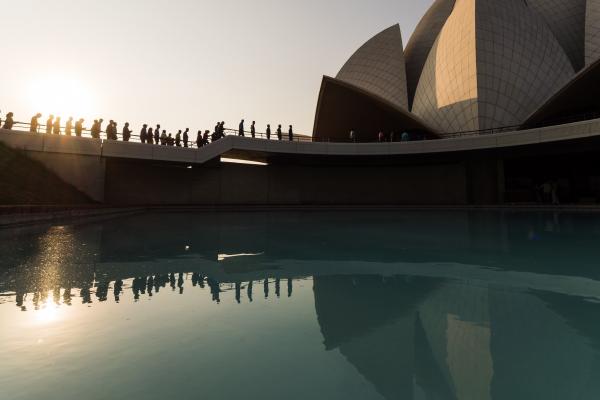In recent weeks, presidential primary contenders have unleashed a litany of sermonesque speeches, evoking Biblical imagery and quoting scripture at campaign stops across South Carolina. This rhetoric demonstrates that the candidates are out to prove their values align with a population that identifies as largely evangelical.
But although Christians dominate the dialogue, theirs is not the only religion in the state. Chances are, candidates have not given much thought to South Carolina’s second largest religious group: Bahá’ís.
Bahá’ís number approximately 7 million followers worldwide, and are the second most geographically widespread religious community. The Bahá'í community has a long history in South Carolina, beginning in the early 1900s, and experiencing a swell in numbers during the middle part of the last century.
Today, with approximately 20,000 members, the state’s Bahá’í community includes mostly African American adherents, along with white and Native American followers and those whose families emigrated from other countries — such as Iran, where the Bahá’í faith was founded.
With members from such a broad range of backgrounds, Bahá’ís have understandably widespread political perspectives, and do not collectively side with either Democrats or Republicans. In fact, Bahá’ís intentionally avoid affiliation with any political party. Although Bahá’í scripture specifically admonishes individuals to shun partisan politics, this does not mean the community avoids involvement with civil society. According to the writings of the faith’s founder Bahá’u’lláh, his followers should “be anxiously concerned with the needs of the age ye live in.”
Bahá’ís – though unaffiliated — are eligible to vote in South Carolina’s open presidential primaries.
So, how might politicians campaigning in South Carolina frame their rhetoric if they were seeking to appeal to Bahá’í voters?
For starters, most campaign speeches would likely be cut in half, because any disparaging comments aimed at their opponents would be out. “Magnify not the faults of others,” writes Bahá’u’lláh “that thine own faults may not appear great.” (This might sound vaguely familiar – oh right, it’s The Golden Rule.)
Similarly, since Bahá’ís consider all of humanity as members of one family, regardless of race or religion, candidates should avoid scapegoating immigrants, demonizing Muslims, or generally maligning others.
There’s a lot in the news that Bahá’ís care deeply about: providing universal quality education of all children, caring for the poor, and being good stewards of the environment. Bahá’í s also believe strongly that we should see the earth as “but one country, and mankind its citizens.” So calling for global consultations to seriously seek ways to end all wars would be a much bigger applause line for Bahá’í s than empty saber rattling.
But a fundamental challenge that a politician would face in attempting to court the Bahá’í vote is that the entire U.S. campaign process is antithetical to how Bahá’ís select their own leadership.
On the surface, there are aspects to Bahá’í elections that are familiar to any democracy: Bahá’í elections occur on a regular schedule — annually on the local and national level, and every five years on the international level. All adult members in the community are entitled to a vote and are eligible to be elected to serve as part of the governing body in their jurisdiction. But at no point is electioneering, lobbying, or campaigning allowed.
Instead, communities gather in silence to select Bahá’í leadership. After prayerful reflection, votes are cast by secret ballot for individuals “who can best combine the necessary qualities of unquestioned loyalty, of selfless devotion, of a well-trained mind, of recognized ability and mature experience.”
Of course, this is an approach that may seem much simpler to implement given the relatively small number of Bahá’ís in any locality. But it is a system that is being implemented in nearly every country on the planet, in villages and cities alike, amongst entirely homogenous populations and those as diverse as a gathering of the United Nations. It is a framework the Bahá’í community offers as a model to shape the way we govern our communities — in a manner that prizes equity, justice, and self-determination.
At a time when politics and corruption have become synonymous, how refreshing and impressive would it be to see, as the central platform of presidential candidates, a strategy towards healthy and integrative goals that allow our nation to “become glorious in spiritual degrees even as it has aspired to material degrees”?
Of course, the values Bahá’ís hold during their own elections – honesty, integrity, and considering one’s neighbor as oneself — are really universal values.
And more precisely, bearing in mind the focus of the religious rhetoric in South Carolina, they are Christian values.
Values our presidential candidates would do well to remember.
Got something to say about what you're reading? We value your feedback!


